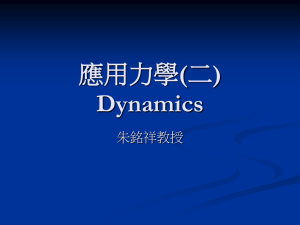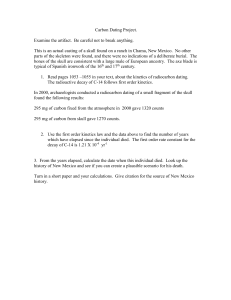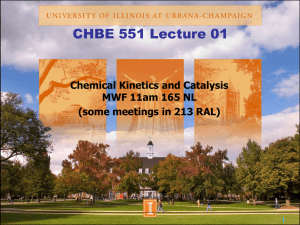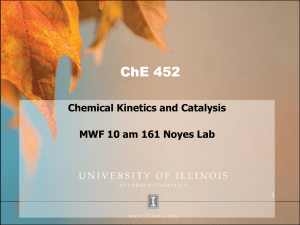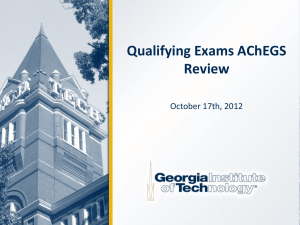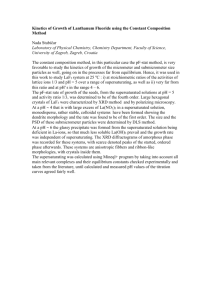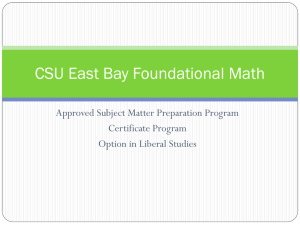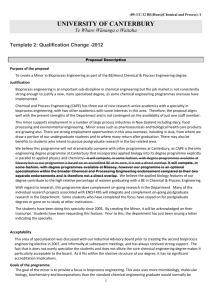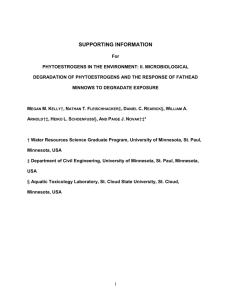Proposal to offer graduate level course base on a existing
advertisement
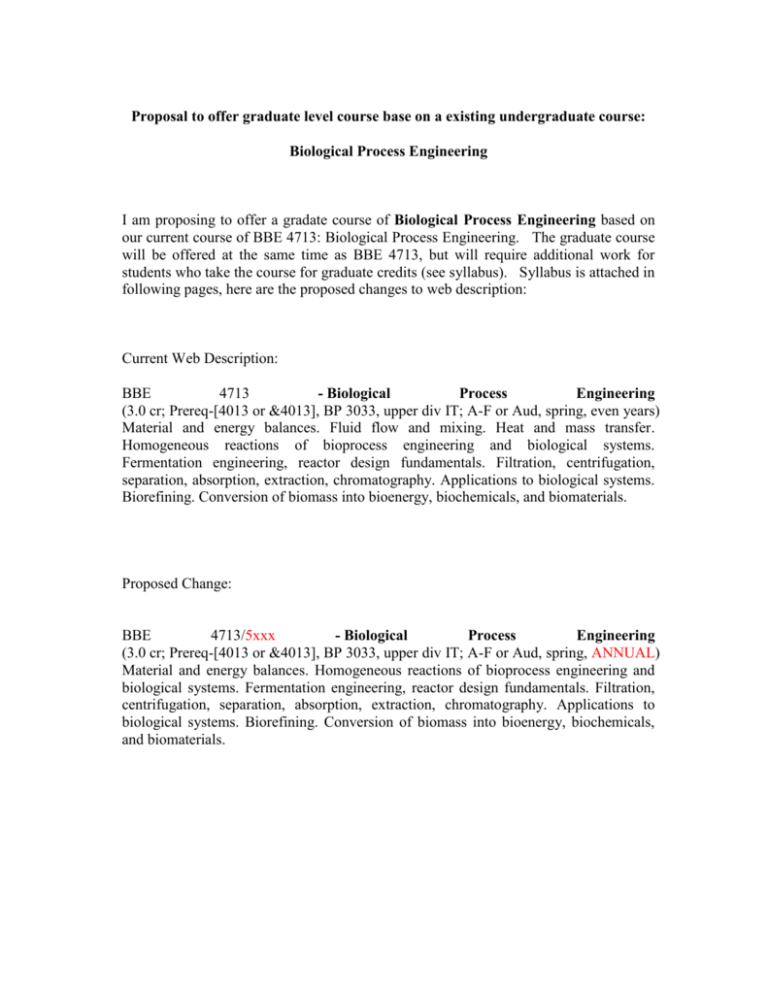
Proposal to offer graduate level course base on a existing undergraduate course: Biological Process Engineering I am proposing to offer a gradate course of Biological Process Engineering based on our current course of BBE 4713: Biological Process Engineering. The graduate course will be offered at the same time as BBE 4713, but will require additional work for students who take the course for graduate credits (see syllabus). Syllabus is attached in following pages, here are the proposed changes to web description: Current Web Description: BBE 4713 - Biological Process Engineering (3.0 cr; Prereq-[4013 or &4013], BP 3033, upper div IT; A-F or Aud, spring, even years) Material and energy balances. Fluid flow and mixing. Heat and mass transfer. Homogeneous reactions of bioprocess engineering and biological systems. Fermentation engineering, reactor design fundamentals. Filtration, centrifugation, separation, absorption, extraction, chromatography. Applications to biological systems. Biorefining. Conversion of biomass into bioenergy, biochemicals, and biomaterials. Proposed Change: BBE 4713/5xxx - Biological Process Engineering (3.0 cr; Prereq-[4013 or &4013], BP 3033, upper div IT; A-F or Aud, spring, ANNUAL) Material and energy balances. Homogeneous reactions of bioprocess engineering and biological systems. Fermentation engineering, reactor design fundamentals. Filtration, centrifugation, separation, absorption, extraction, chromatography. Applications to biological systems. Biorefining. Conversion of biomass into bioenergy, biochemicals, and biomaterials. University of Minnesota Spring 2008 BBE4713/5xxx: Biological Processing Engineering (3 credits) INSTRUCTOR: Lecture: Monday, Wednesday Recitation: Friday COURSE PREREQUISITES BBE 4013 or Concurrent registration in 4013 is required (or allowed), BP 3033 Course description: Capitalization of the power and potentials of biological process and renewable resources are being pursued with a great interest across the world, embracing the challenges of environment protection and shortage of petroleum supply. This course provides opportunities to explore the engineering fundamentals involved biological processing in conversion of bio-based materials for production of chemicals, fuels and energy. Contents will cover enzyme catalysis; enzyme production and manipulation; microbial growth; microbial processing; bioreactor analysis; bioseparation; and a survey of a broader range of emerging biotechnologies such as biosensors and biofuel cells. Course Objectives: To learn fundamentals of bio-reaction engineering and related separation and purification processes for bioproduct and bioenergy industries, such as ethanol fermentation, biodiesel synthesis. By the end of this course, students are expected to be able to conduct calculation of biological processing unit, design the reaction scheme and analyze the parameters to optimize the yield of production. Required & Recommended Materials Required Text Book: Biochemical Engineering. Blanch HW, Clark DS. Marcel Dekker, Inc. 1997. (ISBN: 9780824700997) Bioseparations Science and Engineering, Harrson, RG, Todd, P, Rudge, SR, and Petrides, DP. Oxford University Press, 2003 Recommended Materials Biochemical engineering fundamentals (2nd Edition) J. E. Bailey, D. F. Ollis. (ISBN: 0070032122) Bioprocess Engineering, Basic Concepts, Shuler, ML; Kargi, F. Prentice-Hall, 2005. GRADING POLICIES Class Participation: 5 Points Class attendant is required for both lecturing and field trips. Absence is allowed with prior noticing. Weekly Homework Assignment: 15 Points Homework assigned in the current week is generally due on Wednesday of the following week, unless specified otherwise. late submission is not accept unless with consent from advisor. Exam 1 25 Points Exam 2 25 Points Midterm exams will be problem solving based exam (open book and open notes). Final Exam 30 Points Required for Graduate Credits: Term Paper Miniposter Presentation 10 Points 5 Points Unit / Module Monday Week 1 (Jan. 22) Semester starts Wednesday Friday/Reci Course Introduction Nature of industrial biochemical processes Scheduling Presentation Paper Topics HW Week 2 (Jan 28) PW/JZ Units involved in bioprocessing Conversion of Biomass Background of Biology/Biochemistry (Zhu) Reaction Theory (Zhu) Homework 1 Week 3 (Feb. 4) JZ/PW Reaction Kinetics for Biological Systems (zhu) Background of Proteins/Enzymes Enzyme production Growth of microbes Recitation Homework 2 Week 4 (Feb. 11) Enzymatic Reaction PW Kinetics Factors Controlling Enzymatic Reaction Kinetics Recitation Homework 3 Week 5 (Feb. 18) Enzyme Immobilization PW Reaction Engineering with Immobilized Enzymes I Recitation Homework 4 Reaction Engineering Week 6 (Feb. 25) with Immobilized PW Enzymes II Exam 1 Recitation Week 7 (Mar. 3) JZ Cell Growth Kinetics II (Zhu) Production Kinetics in Cell Culture (Zhu) Cell Growth Kinetics I (Zhu) Week 8 (Mar. 10) Bioreactor I JZ Bioreactor II Homework 5 Homework 6 Week 9 (Mar. 17) Spring break Week 10 (Mar. 24) Bioreactor III/Review Week 11 (Mar. 31) Bioseparation Homework 7 Week 12 (Apr. 7) PW Bioseparation Homework 8 Week 13 (Apr. 14) Bioseparation PW Homework 9 Exam II Week 14 (Apr. 21) Applied Bioprocess: PW biofuel cells Biodiesel Synthesis Week 15 (Apr. 28) Ethanol Production PW Nanobiotechnology Week 16 (May 5) PW Week 17 (May 12) PW Field Trip ? Homework 10 Final Term Paper Due MIniposter and Class Presentation On Bioproducts and Bioenergy (5 Points) Prepare a brief (5~10 min) oral presentation to class on biological process for production of chemicals, fuels and energy from biorenewable resources. Be prepared to explain the molecular structure and applications of the product, how it is made, and its unique properties of advantages. It should be materials that have not already covered in class. This topic must be different from that of your term paper. Include with your presentation a one page handout describing your material that includes a diagram with the structure of the product, production process and properties and applications. Include references you used to learn about this material. When you have your presentation ready, hand in your single page handout to Professor Wang; you can make your brief presentation to the class during any class period between now and the end of the semester, except the final exam week of this course. Biological Processing Term Paper (10 Points) A final paper on a specific topic related to specific issues of biological processing, both operational and fundamental mechanisms, is due on the last day of class. The topic of this paper must be a cohesive description of a specific area of biological processing derived from at least 3 to 5 refereed journal articles and a recent review article. The topic must not be one covered in depth in class. To choose a topic, first search key words related the material presented in lectures or in the supplemental readings provided for lectures. Then search the most recent refereed literature articles using, Science Citation Index, Sci Finder Scholar or other search engines available on the U of M Lumina website for the Walter Science and Engineering Library. Continue searching both key words and author names until you find the most recent published literature on your topic. If you have problems choosing a topic or finding appropriate literature, please see me. A title and one page preliminary outline for your paper is due before Exam 2. This outline will be returned to you with my comments and suggestions. I encourage you to discus your choice of topic with me well before submitting your outline. The paper must be double spaced (single sided) and be 5 – 10 pages in length (maximum length 10 pages including figures, tables and references). It may briefly discuss the technology, the product, and the engineering problems; focus of discussion must be on the engineering fundamentals (like reaction kinetics, operational conditions, and process optimization). Statements, data, figures and tables derived from reference must be cited in text by either the first author last name an date or sequentially – you are strongly encouraged to generate your own demonstrations to effectively reflect your discussion and opinion. The references may be alphabetical or sequential but must be complete in a reference style (including the names of all authors, year of publication, the full title of each article, abbreviated journal name, volume, first and last page numbers) acceptable for a scientific journal such as those published by the Journal of the American Chemical Society or Nature. Each figure and table must be numbered sequentially and have a descriptive legend. Points will be awarded as follows: * Understanding of the importance of the topic 20% * Description of the method and approach 20% * "Engineering" concept and calculations 20% * Number, quality and relevance of references 10% * Grammar, figures, legibility, neatness 15% * Overall effort and originality 15%


